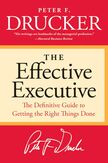 I finally got around to reading the classic The Effective Executive: The Definitive Guide to Getting the Right Things Done by Peter F. Drucker. It did not disappoint. It was short and sweet and had a lot of nuggets of wisdom. As I've recently been part of a very fast growing team, I've wondered how executive time is best spent. This book provides a great theoretical framework for thinking about that. Yes, some of the language around computers or secretaries is a bit dated, but that did not interfere in any way with the main messages. I highly recommend this to someone in a leadership role in any fast growing organization. My main notes and takeaways are below. Intro by Jim Collins
First, manage thyself Do what you’re made for. Build on your strength. Work how you work best. Count your time and make it count Better meetings Don’t make a hundred decisions when one will do Find your one big distinctive impact Stop what you would not start Run lean Be useful Preface Intro: what makes an effective executive What needs to be done What is right for the enterprise Action plans Responsibility for decisions Responsibility for communicating Focus on opportunities rather than problems Run productive meetings Say we rather than I Get the knowledge you need first Create and frequently revise action plan Listen first. Speak last. 1 effectiveness can be learned Knowledge workers 5 practices Know where time goes Focus on results and outward contribution Build on strengths not weaknesses Concentrate on the few major areas where can get results Make effective decisions 2 know thy time Recording time Managing time Consolidating time Time is the limiting resource Time diagnosis. Record time use. Don’t use memory to record later. Which activities could be removed or delegated Ask others: what do I do that wastes your time and doesn’t contribute to your effectiveness? Never have the same crisis twice. Put things down into routine. Remove extraneous meetings Consolidate discretionary time. Meetings Monday’s and Friday’s. Tue through thu left open for work or pop ups. Scheduled daily work period. 3 what can I contribute Focus on contribution not effort 4 making strength productive Don’t build impossible jobs no one can do 5 first things first Concentrate and focus one thing at a time Ignore past and sunk costs 6 elements of decision making Is this a generic situation or an exception Generic situations need rule or policy or principle Start out with what is right and not just what is acceptable Go and look for oneself to verify information 7 effective decisions Consider alternatives Encourage dissent and discussion Don’t make decision until there is disagreement Conclusion effectiveness must be learned Self discipline Afterword How will you make Monday different Make list of posteriorities (opposite of priorities: what you won’t do)
0 Comments
Your comment will be posted after it is approved.
Leave a Reply. |
Archives
June 2024
Categories
All
Subscribe |
 RSS Feed
RSS Feed
